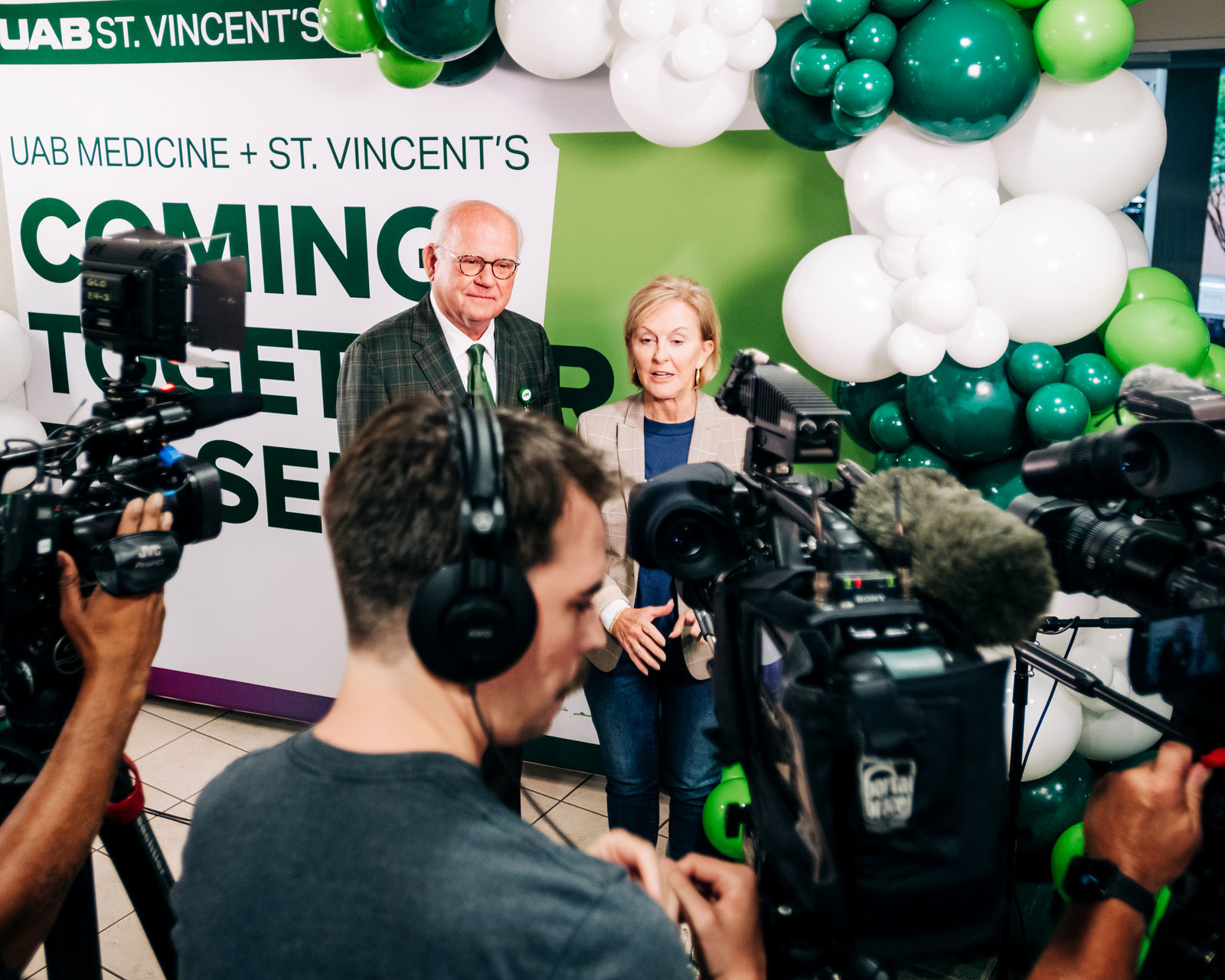UAB Media Protocols and Guidelines

The UAB Office of Marketing and Communications oversees UAB’s public relations functions, including integrated internal and external communications and media relations. A renowned public doctoral research university and academic medical center with a growing campus, vibrant student life, expansive impact in the community and a $12.1 billion annual economic impact in the state, UAB is committed to the creation and dissemination of knowledge that will change the world.
Marketing and Communications recognizes the importance of the news media to an informed public and works with reporters to communicate significant developments, as well as information about our people, operations and outcomes. We regularly communicate about how our students, faculty, staff, alumni and supporters are advancing all areas of our mission: education, health care, research, community service and economic development. In addition, Athletic Communications works with news media to communicate information specific to UAB Athletics.
Download UAB Media Protocols and Guidelines Opens a PDF.
Specific Guidelines
The following protocols and guidelines are intended to support the important work happening throughout the UAB community and facilitate constructive interactions with the news media:
Resources for Media Resources for the UAB Community
Media Contacts
UAB Public Relations works with the news media to support the institution’s strategic goals and inform the public. Contact us for more information or to request phone, in-person, e-mail for interviews with our experts, including those within the UAB Health System.

Alicia Rohan
Director of Public Relations
Leads strategy development and implementation for the team of public relations professionals to coordinate external communications for the university and health system, including media relations, emergency communication and special projects. Serves as public information officer for UAB and UAB Medicine.

Adam Pope
Manager of Public Relations
Leads external communications for units within the medical entities. Pope and his team proactively tell stories through external media outlets, featuring news about research, clinical happenings, patient stories and beyond at UAB. The team works reactively to connect appropriate experts with media on subject matter expertise.
Specific beats include: Health System Administration; Heersink School of Medicine; Medical Facilities; Medical Partnerships/Alliances; School of Health Professions; Comprehensive Healthy Living Research Center; Live HealthSmart Alabama; Department of Pathology; Department of Surgery; Transplantation;

Brianna Hoge
Manager of Public Relations
Leads external communications for units within the university campus and professional schools. Hoge and her team proactively tell stories through external media outlets, featuring news about the arts, student stories, graduate and undergraduate research and beyond. The team works reactively to connect appropriate experts with media on subject matter expertise.
Specific beats include:
- College of Arts and Sciences: Department of Anthropology; Department of Criminal Justice; Department of Math; Department of Physics; Department of Political Science; Department of Psychology
- Heersink School of Medicine, Department of Psychiatry; School of Dentistry; School of Education; Administrative News; Office of the Provost for Student and Faculty Success; Office of Access and Engagement; Enrollment, Admissions, Financial Aid; Human Resources; Student Affairs and Student Life;

Shea Allen
Marketing Manager for UAB St. Vincent's
Identifies and develops stories that highlight research, faculty news, patient stories, clinical stories and beyond at UAB St. Vincent’s. Works reactively to connect appropriate experts with media on subject matter expertise.

Micah Hardge
Public Relations Specialist
Identifies and develops stories that highlight research, faculty news, patient stories, clinical stories and beyond at UAB. Connects media with experts to enhance their story.
Specific beats include: Department of Anesthesiology; Department of Dermatology; Department of Family Medicine; Department of Gastroenterology and Hepatology; Department of Nephrology; Department of Ophthalmology/UAB Callahan Eye Hospital; Department of Otolaryngology/ENT; Department of Pulmonary, Allergy and Critical Care Medicine; Department of Surgery: Gastrointestinal; Department of Telemedicine; Department of Urology; Primary Care

Anna Jones
Senior Public Relations Specialist
Identifies and develops stories that highlight research, faculty news, patient stories, clinical stories and beyond at UAB. Connects media with experts to enhance their story.
Specific beats include:
- O’Neal Comprehensive Cancer Center; Department of Cardiology; Department of Emergency Medicine; Department of Gerontology, Geriatrics and Palliative Care; Department of Radiology; Department of Hematology/Oncology; Division of Infectious Diseases; Department of Physical Medicine and Rehab; Department of Radiation Oncology
- Department of Surgery: Acute Care; Breast and Endocrine; Cardiothoracic; General Surgery; Orthopaedic Surgery; Plastic; Surgical Oncology; Trauma; Vascular Surgery & Endovascular Therapy; Oral and Maxiofacial Surgery

Tehreem Khan
Public Relations Specialist
Identifies and develops stories that highlight research, faculty news, student stories and beyond at UAB. Connects media with experts to enhance their story.
Specific beats include:
- Collat School of Business; School of Nursing; School of Optometry; Facilities; Honors College; Office of International and National Fellowships and Scholarships
- College of Arts and Sciences: Biology; Chemistry; Computer Sciences; History; Philosophy

Shannon Thomason
Senior Public Relations Specialist
Identifies and develops stories that highlight the arts, faculty news, student stories and beyond at UAB. Connects media with experts to enhance their story.
Specific beats include:
- Advancement; The Graduate School; Libraries; National Alumni Society; WBHM
- The Arts at UAB: AEIVA; Alys Stephens Center; Arts in Medicine; ArtPlay
- College of Arts and Sciences: Department of Art and Art History; Department of Communication Studies; Department of Music; Department of Theatre; Institute for Human Rights; Department of World Languages and Literatures